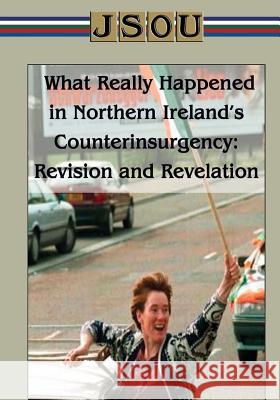What Really Happened in Northern Ireland's Counterinsurgency Revision and Revelation » książka
What Really Happened in Northern Ireland's Counterinsurgency Revision and Revelation
ISBN-13: 9781502835338 / Angielski / Miękka / 2014 / 54 str.
What Really Happened in Northern Ireland's Counterinsurgency Revision and Revelation
ISBN-13: 9781502835338 / Angielski / Miękka / 2014 / 54 str.
(netto: 56,98 VAT: 5%)
Najniższa cena z 30 dni: 60,00
ok. 16-18 dni roboczych
Bez gwarancji dostawy przed świętami
Darmowa dostawa!
The current conflicts facing the United States and its allies around the world have brought the discussion of counterinsurgency to the forefront of security studies and international politics. Dr. Thomas Henriksen's monograph on Northern Ireland wades into the discussion regarding good historical case studies that can best provide insight into our current situation. There is a predilection for scholars and professional military officers to look at a limited number of case studies, such as Malaya and Vietnam, to seek insights about counterinsurgency prowess and ways to improve today's fighting forces. Dr. Henriksen's selection of Northern Ireland provides a rich case study of a hotly contested space that represents an ethnic and religious conflict set in Western Europe. He provides an excellent, short, historical background to frame his analysis. Understanding the historical antecedents of an insurgency is a critical element in any case study because insurgencies are local, not global events. International issues may influence what occurs in an insurgency, but locals rise up in rebellion for their personal grievances or desires. As you read the monograph, I strongly encourage you to consider the case study through the prism of a "whole of government" approach to dealing with insurgency. Counterinsurgency is a long-term process that, especially in a democracy, requires widespread, sustained political support from the broad elements of government. The ultimate goal of this whole of government approach is to wean the population away from supporting the insurgents. Restrained security force operations provide a secure "space" for political and economic opportunities/reforms to "steal the insurgents' thunder." The execution of a nuanced campaign is the difficult task-that is, the devil is in the details. Is Northern Ireland a viable or valid model for today's world? It is, but the reader must be careful in drawing quick conclusions. Some underlying issues need to be addressed while using this case study, and the key one is the role of the United Kingdom's government. In other words, the U.K. is a wealthy, capable, modern, liberal democracy with a well-developed state system and civil society. In today's conflicts in Iraq and Afghanistan, the local states do not approach the capacity and capabilities of the United Kingdom. Is an outside power capable of playing the role of "arbiter" that the central government was able to project during the 30-year "Troubles" in Northern Ireland? How does an outside power provide the security necessary for political and economic reforms? Can a weaker state support these necessary reforms? The answers to these questions will be borne out in the coming years.
Zawartość książki może nie spełniać oczekiwań – reklamacje nie obejmują treści, która mogła nie być redakcyjnie ani merytorycznie opracowana.











